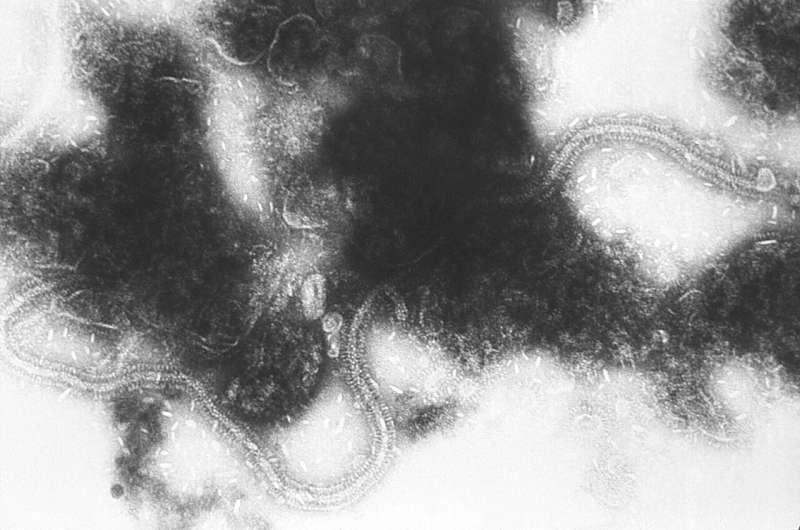Home » Health News »
New vaccine formulation protects newborn mice against respiratory syncytial virus (RSV)

Respiratory syncytial virus (RSV) is the leading global cause of death in children under age 5 and lacks an effective vaccine. In a study from the Precision Vaccines Program at Boston Children’s Hospital, a new vaccine formulation protected newborn mice against infection and evoked strong responses in immune cells from human newborns in the laboratory. Results were reported August 2 in Nature Communications.
RSV is a leading cause of infant hospitalizations in the U.S. and is also a threat in older adults. While several potential RSV vaccines are in late-stage clinical trials in adults, there have been no such vaccines for children since the dramatic failure of a candidate vaccine in 1966. The antibodies induced by that vaccine could not neutralize the virus; instead, the vaccine caused an allergic-like (“Th2”) white blood cell response in the infants’ airways. This resulted in respiratory distress when vaccinated infants became infected with RSV—making them sicker and leading to some deaths.
“Consequently, pediatric vaccine development was halted, recognizing that the immune system in kids is different from that in adults,” says Simon van Haren, Ph.D., an immunologist in the Precision Vaccines Program and first author on the new paper.
Rethinking the RSV vaccine
Van Haren, Ofer Levy, MD, Ph.D., who directs the Precision Vaccine Program, and their collaborators decided to reopen the case and explore other ways that vaccination could stimulate the newborn immune system without causing harm. They examined different receptors on immune cells and different combinations of vaccine adjuvants (ingredients added to strengthen the immune response) that might stimulate these receptors, making vaccination more effective.
In 2016, they reported in the Journal of Immunology that a combination of two potential adjuvants, stimulating the TLR7/8 and Mincle receptors, provoked robust responses in newborns’ antigen-presenting cells, critical for kickstarting cellular immune defenses. They saw strong activation of type 1 T-helper (“Th1”) responses. These Th1 responses are hard to stimulate in newborns, but are needed for a strong defense against viral pathogens; the failed RSV vaccine did not induce a Th1 response.)
For the new work, van Haren and Levy partnered with Dennis Christensen, Ph.D., and Gabriel Pedersen, Ph.D. at the Statens Serum Institut in Copenhagen, Denmark, to formulate a new protein-based RSV vaccine. This vaccine used the same adjuvant combination reported in 2016, which they named CAF-08, coupled with a protein from RSV and packaged inside fatty particles called liposomes.
The team first administered the CAF-08/RSV vaccine to cultured antigen-presenting cells obtained from donated cord blood from human newborns. Led by Hanno Steen, Ph.D., at Boston Children’s, the researchers comprehensively profiled the cells’ responses with phosphoproteomics. This revealed enhanced production of cytokines (signaling molecules) by Th1 cells and other indicators of a robust immune response.
“Dr. Steen’s group was instrumental in helping us define the mechanism of action of our adjuvant combination, and why it works so well in children and less so in adults,” says van Haren. “It lays out the molecular requirements for an adjuvanted vaccine to work in early life.”
They next tested CAF-08/RSV in newborn mice and found that it protected against a direct challenge with RSV, with no evidence of any harm to the animals. Further studies showed that it induced Th1 cells and CD8+ T cells (also important in inducing cellular immune responses) that specifically recognized RSV, as well as neutralizing antibodies.
“The undesirable components of the immune response did not come into play,” notes van Haren.
Notably, this vaccine formulation did not induce the same protective Th1 immune responses in blood cells from either human adults or adult mice.
“The combination is most active in early life,” says Levy, the study’s senior investigator. “We hope this adjuvant combination, tailored to be effective in early life, will eventually enable the vaccination of infants against not only RSV, but also influenza, coronaviruses, and other serious infections.”
Source: Read Full Article



